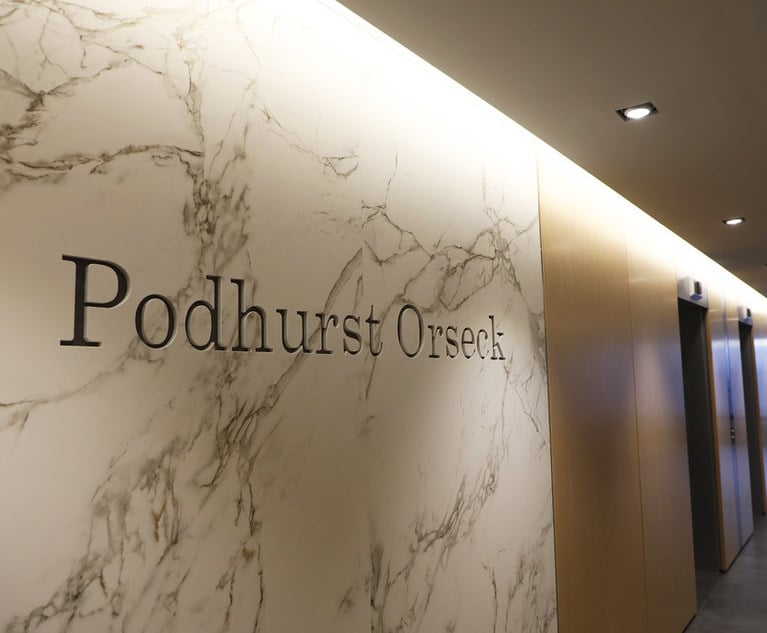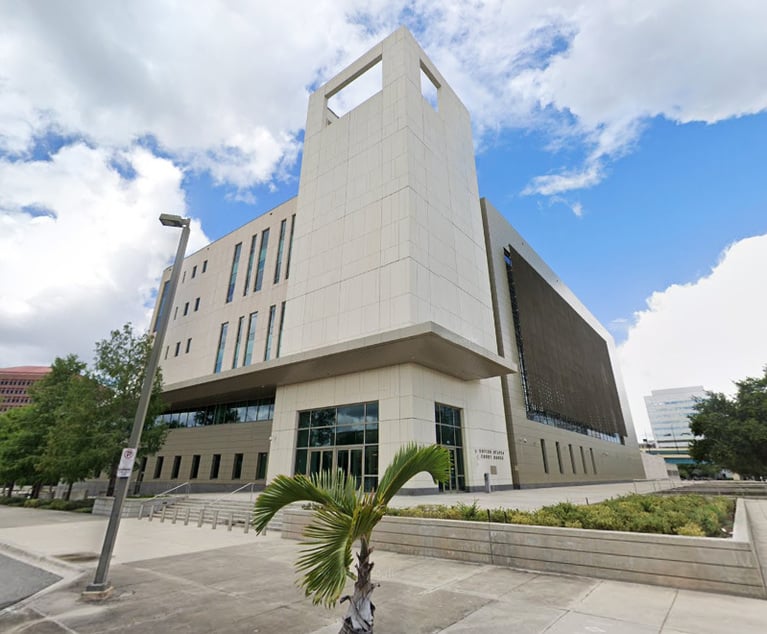Federal Judge Sanctions Plaintiff, Cautions Defense about Bypassing Arbitration in Patent Infringement Case
Plantation lawyer Andrew S. Rapacke improperly filed a patent infringement case that should have gone straight to arbitration, according to U.S. District Judge Cecilia M. Altonago in Southern District of Florida, who awarded some — but not all — attorney fees and costs to the defense.
January 08, 2019 at 03:48 PM
4 minute read
 U.S. District Judge Cecilia Altonaga, Southern District of Florida. Photo: J. Albert Diaz/ALM.
U.S. District Judge Cecilia Altonaga, Southern District of Florida. Photo: J. Albert Diaz/ALM.
Federal Judge Cecilia M. Altonaga in the Southern District of Florida awarded sanctions against the plaintiff in a patent infringement case on Monday, ruling that the company improperly sued and filed three motions in a dispute that should have instead gone straight to arbitration.
Now, under Federal Rule of Civil Procedure 11, the plaintiff will pay attorney fees and costs for ignoring binding arbitration clauses in three different agreements. The rule applies only to papers filed in the court, such as pleadings and motions, not attorney misconduct.
But the defense didn't get everything it asked the court, losing out on fees incurred doing “wasteful work” during the earliest stages of the lawsuit. According to the court order, rather than focusing on refuting claims in the suit by litigating a motion to dismiss, the defense should have simply pushed for arbitration from the start.
South Carolina-based rifle and ammunition developer CheyTac USA LLC brought the federal lawsuit in May 2017 against rival company Nextgen Tactical LLC and its manager Dennis Omanoff, who led CheyTac before creating a spin-off company.
The plaintiff sought damages and a jury trial over allegations Nextgen ripped off the designs of its rifle barrels and copied its ballistic flight technology for ammunition — patents Omanoff maintained he owned.
The case was ultimately dismissed and directed to arbitration, where it settled confidentially.
Arbitration aims to resolve a dispute with an impartial adjudicator, whose ultimate decision on a matter is final and binding. CheyTac had argued that the arbitration provisions in the contracts varied and conflicted with one another. However, as the defendant was a spin-off entity —not a regular company — the plaintiff argued it might be exempt from the arbitration clause.
But CheyTac was wrong to file its complaint, along with a motion for temporary restraining order and two motions for preliminary injunctions, according to Altonga's order, which held the plaintiff was “flouting the arbitration provisions, the black letter of the Federal Arbitration Act, Supreme Court precedent and the American Arbitration Association's Commercial Rules.”
Instead, the judge found CheyTac should have first sought advice from an arbitrator about whether its argument had merit.
Plaintiffs counsel Andrew S. Rapacke of the Rapacke Law Group in Plantation declined to comment.
'Fruitless exercise'
 John Da Grosa Smith of Spector Gadon & Rosen's Philadelphia office.
John Da Grosa Smith of Spector Gadon & Rosen's Philadelphia office.Counsel to the defense, John Da Grosa Smith of Spector Gadon & Rosen's Philadelphia office, moved for the sanctions in October 2017 and referred to the entire case as “a fruitless exercise.”
“There was a harm that was incurred as a result of that frolic and detour,” Smith said. ”That journey never should have happened.”
It's not yet clear how much the sanctions will cost the plaintiff, but according to Smith it won't be cheap.
“The complexity of federal court and federal procedure comes with a great deal of expense,” Smith said. “One of the main reasons to have arbitration is to have a forum that's more efficient, more confidential and less costly, so if you traveled through one of the most complex and expensive forums on your way to it, it totally defeats the purpose.”
In Smith's view, it's a simple case of actions meeting consequences.
“When you enter into a contract and you agree to arbitrate any dispute, you are agreeing in connection with that entire contract to resolve the dispute in arbitration,” Smith said. “That's part of the bargain for exchange of whatever your agreement is.”
Read the full court order:
More attorney fee stories:
'How Could They Not Show?' Plaintiff to Pay for Opposing Counsel's Long Treks
Court Affirms Sanctions in South Florida Attorney Fee Fight
Appellate Court Imposes Sanctions Against Outspoken Foreclosure Attorney
This content has been archived. It is available through our partners, LexisNexis® and Bloomberg Law.
To view this content, please continue to their sites.
Not a Lexis Subscriber?
Subscribe Now
Not a Bloomberg Law Subscriber?
Subscribe Now
NOT FOR REPRINT
© 2025 ALM Global, LLC, All Rights Reserved. Request academic re-use from www.copyright.com. All other uses, submit a request to [email protected]. For more information visit Asset & Logo Licensing.
You Might Like
View All
Muhammad Ali's Daughter Accused of Ignoring South Florida Judge

In Upholding Ruling, Sixth DCA Certifies Question to Florida Supreme Court
4 minute read
Podhurst Orseck, Client and Ex-Partner Face Nearly $575K in Attorney Fees
4 minute read
Judge Recommends $424K in Attorney Fees in BioPlus Data Breach Settlement
3 minute readTrending Stories
- 1'A Death Sentence for TikTok'?: Litigators and Experts Weigh Impact of Potential Ban on Creators and Data Privacy
- 2Bribery Case Against Former Lt. Gov. Brian Benjamin Is Dropped
- 3‘Extremely Disturbing’: AI Firms Face Class Action by ‘Taskers’ Exposed to Traumatic Content
- 4State Appeals Court Revives BraunHagey Lawsuit Alleging $4.2M Unlawful Wire to China
- 5Invoking Trump, AG Bonta Reminds Lawyers of Duties to Noncitizens in Plea Dealing
Who Got The Work
J. Brugh Lower of Gibbons has entered an appearance for industrial equipment supplier Devco Corporation in a pending trademark infringement lawsuit. The suit, accusing the defendant of selling knock-off Graco products, was filed Dec. 18 in New Jersey District Court by Rivkin Radler on behalf of Graco Inc. and Graco Minnesota. The case, assigned to U.S. District Judge Zahid N. Quraishi, is 3:24-cv-11294, Graco Inc. et al v. Devco Corporation.
Who Got The Work
Rebecca Maller-Stein and Kent A. Yalowitz of Arnold & Porter Kaye Scholer have entered their appearances for Hanaco Venture Capital and its executives, Lior Prosor and David Frankel, in a pending securities lawsuit. The action, filed on Dec. 24 in New York Southern District Court by Zell, Aron & Co. on behalf of Goldeneye Advisors, accuses the defendants of negligently and fraudulently managing the plaintiff's $1 million investment. The case, assigned to U.S. District Judge Vernon S. Broderick, is 1:24-cv-09918, Goldeneye Advisors, LLC v. Hanaco Venture Capital, Ltd. et al.
Who Got The Work
Attorneys from A&O Shearman has stepped in as defense counsel for Toronto-Dominion Bank and other defendants in a pending securities class action. The suit, filed Dec. 11 in New York Southern District Court by Bleichmar Fonti & Auld, accuses the defendants of concealing the bank's 'pervasive' deficiencies in regards to its compliance with the Bank Secrecy Act and the quality of its anti-money laundering controls. The case, assigned to U.S. District Judge Arun Subramanian, is 1:24-cv-09445, Gonzalez v. The Toronto-Dominion Bank et al.
Who Got The Work
Crown Castle International, a Pennsylvania company providing shared communications infrastructure, has turned to Luke D. Wolf of Gordon Rees Scully Mansukhani to fend off a pending breach-of-contract lawsuit. The court action, filed Nov. 25 in Michigan Eastern District Court by Hooper Hathaway PC on behalf of The Town Residences LLC, accuses Crown Castle of failing to transfer approximately $30,000 in utility payments from T-Mobile in breach of a roof-top lease and assignment agreement. The case, assigned to U.S. District Judge Susan K. Declercq, is 2:24-cv-13131, The Town Residences LLC v. T-Mobile US, Inc. et al.
Who Got The Work
Wilfred P. Coronato and Daniel M. Schwartz of McCarter & English have stepped in as defense counsel to Electrolux Home Products Inc. in a pending product liability lawsuit. The court action, filed Nov. 26 in New York Eastern District Court by Poulos Lopiccolo PC and Nagel Rice LLP on behalf of David Stern, alleges that the defendant's refrigerators’ drawers and shelving repeatedly break and fall apart within months after purchase. The case, assigned to U.S. District Judge Joan M. Azrack, is 2:24-cv-08204, Stern v. Electrolux Home Products, Inc.
Featured Firms
Law Offices of Gary Martin Hays & Associates, P.C.
(470) 294-1674
Law Offices of Mark E. Salomone
(857) 444-6468
Smith & Hassler
(713) 739-1250






